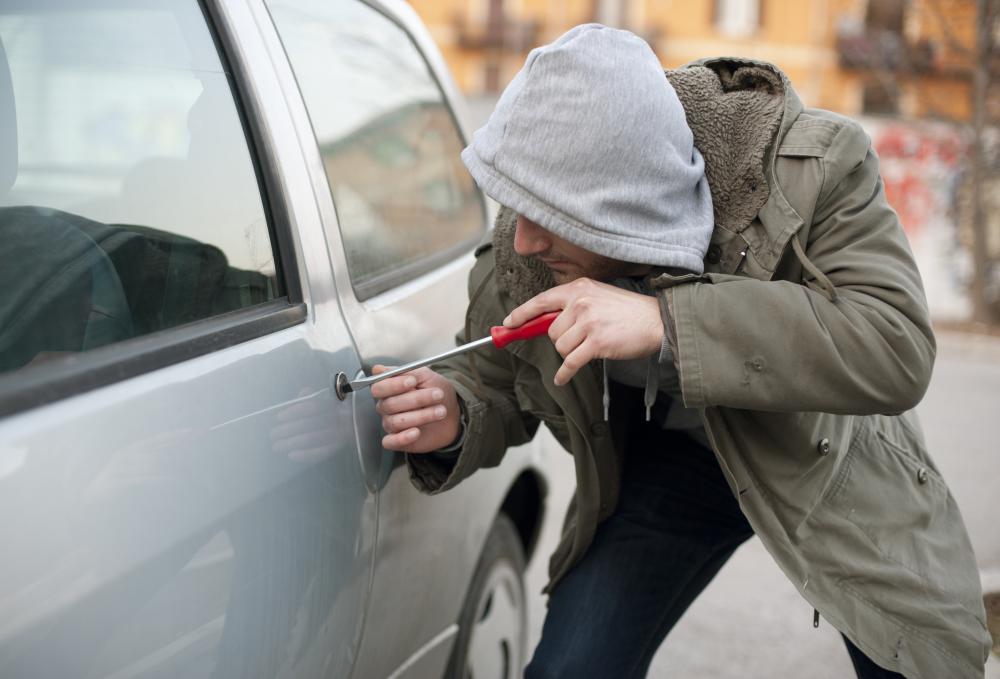At WiseGEEK, we're committed to delivering accurate, trustworthy information. Our expert-authored content is rigorously fact-checked and sourced from credible authorities. Discover how we uphold the highest standards in providing you with reliable knowledge.
What is Grand Theft?
Grand theft is a term used to describe any theft that in which the items taken exceed a certain monetary value. The exact cost of the item or items needed to constitute a theft of this magnitude may vary based on location. In the United States, grand theft can be charged as a misdemeanor or a felony depending on the jurisdiction and the situation surrounding the theft. Factors which may affect how the case is charged may include whether force was used during the theft and the exact value of the stolen goods.
In some cases, items listed as beingbelow the minimum monetary value may still be counted as grand theft. Cars, for example, are generally listed as grand theft auto even in vehicles that are good for little more than scrap metal. This rule varies by location. Some areas may require that a car be in running condition, while others do not.

For someone who has committed grand theft to be tried for a felony, proof must be given that the accumulated value of any items stolen is worth a set value. If they are found to be under that value, then he or she may be charged with a misdemeanor. An item’s value may be hard to prove if it was not insured, especially since stolen property is often not recovered. When it is recovered, damage may have occurred, thus altering the overall value if the plaintiff cannot prove the damage was done after the robbery occurred.

Nearly any case of grand theft in which bodily harm or threatened bodily harm has occurred will be tried as a felony, with additional charges added. Theft when combined with bodily harm or threatened harm is considered robbery rather than theft. This crime often comes with a much harsher punishment scale, especially if the items taken are of high value. To make a case of robbery, however, it must be proven that the defendant threatened bodily harm at the time of the theft rather than at a later or earlier time.
There have been some instances in which a defendant was cleared of grand theft or robbery charges when it has been proven that the items or cash in question were owed to him or her by the plaintiff. This would mean that he was simply taking something that rightfully belonged to him, although charges of assault or threatened assault may still stand. Cases such as this are generally rare because it is very hard to prove something is owed unless there is a contract signed by both parties.
AS FEATURED ON:
AS FEATURED ON:












Discussion Comments
What proof do I need that my deceased father's cash gift of $25,000 to me that was kept and stolen from me, from his home safe, along with other contents, by one sibling to his ex-wife, right in front of me and others?
The names on the envelopes, with the amounts mentioned in a probate court (I'm trying to take over the estate to assure my inheritance and take it intestate, as the original documents are destroyed.)
I want to recover my gift. The two people tried to go to a settlement, without my knowledge, and use the funds from the safe (to allow her to keep the money she took), as my siblings already have theirs, so I think that's embezzlement, so that the ex would not pursue any further attempts to collect against the estate and allow that one sibling to be the head trustee, entering into a trust without authorization from the majority.
Fortunately, when I got wind of all of this, I notified the court in time to disagree with the sibling's appointment. Now I need to follow through on our settlement next week. Do I call the police and go for the felony theft to start with, as I have some clear evidence already, or give them five minutes to give it all back, along with my $25K personal gift from my Dad to me? Or use the police anyway, as I may need more back-up and more wrongdoing probably can be found, like missing vehicles, etc.?
What is available to me as a recourse as my deceased fathers friend took the cash gift my father had me promise to get from his home, yet instead, my sibling ~ who empied out his safe after his death, give her 4 envelopes, one belonging to me for 25G as my father told me... and 3 others, that friend claims 'silence' only.... yet they retain a lawyer, and my sibling has one who is a litigator, and I have one to take over an intestate estate... this gift isn't part of the estate either, it was for me, as my siblings received theirs already... what do I do now, when we sit at a settlement table next week?
Post your comments